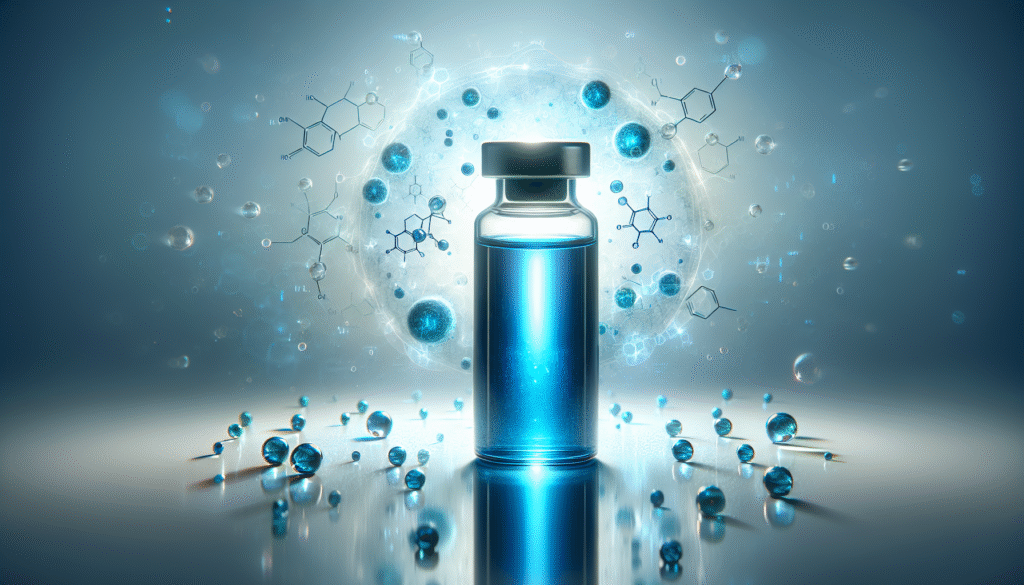
Have you ever wondered how certain compounds can dramatically enhance your health and well-being? Methylene blue, a synthetic dye, has gained attention for its fascinating properties, particularly as an antioxidant. Its potential roles in medicine, neuroscience, and overall wellness merit a closer examination.

Understanding Oxidative Stress
Before discussing how methylene blue acts as an antioxidant, it is essential to understand oxidative stress. This concept refers to an imbalance between free radicals—unstable molecules that can cause cellular damage—and antioxidants that neutralize these free radicals in the body.
The Role of Free Radicals
Free radicals are byproducts of various biological processes, including metabolism and environmental factors like pollution and radiation. While some free radicals are necessary for normal bodily functions, excessive amounts can lead to oxidative stress. This condition has been implicated in numerous diseases, including cancer, cardiovascular diseases, and neurodegenerative disorders.
The Importance of Antioxidants
Antioxidants are molecules that can donate an electron to free radicals, effectively neutralizing them without becoming destabilized themselves. This process protects cells from damage and is crucial for maintaining overall health. Many vitamins, minerals, and natural compounds possess antioxidant properties, contributing to their protective roles in the body.
The Chemical Properties of Methylene Blue
Methylene blue has been utilized in medicine for over a century, primarily as a dye and an antiseptic. However, its chemical properties make it a remarkable antioxidant.
Structure and Stability
Methylene blue, scientifically known as methylthioninium chloride, has a unique chemical structure that allows it to interact effectively with free radicals. Its stability under physiological conditions ensures that it can exert its antioxidant effects without degrading quickly.
Redox Potential
The redox (reduction-oxidation) potential of methylene blue allows it to function as both an electron donor and acceptor. This dual capability enhances its role as an antioxidant. When methylene blue donates electrons, it neutralizes free radicals, thus mitigating oxidative stress in the body.
Mechanisms of Action as an Antioxidant
Understanding how methylene blue operates at a cellular level sheds light on its potential benefits as an antioxidant.
Electron Donation and Neutralization
Methylene blue can donate electrons to free radicals, stabilizing these harmful molecules. Through this process, it effectively neutralizes reactive oxygen species (ROS), reducing oxidative stress in the body. The conversion of methylene blue to its leuco form (a reduced version) plays a significant role in this electron donation.
Regeneration of Cellular Components
Another fascinating aspect of methylene blue’s action is its ability to regenerate vital cellular components. By enhancing mitochondrial function—where energy production occurs—methylene blue assists in maintaining the integrity of cells and tissues. Improved mitochondrial function also contributes to better energy levels and cognitive health.
Inhibition of Lipid Peroxidation
Lipid peroxidation is a damaging process that affects cell membranes and can result in cell death. Methylene blue has shown the ability to inhibit lipid peroxidation, thus preserving cell membrane integrity. This protective role extends to various organs and systems in the body, particularly the brain.
Clinical Applications of Methylene Blue
The application of methylene blue as an antioxidant has drawn interest across various fields of medicine and research.
Neuroprotection
One of the most promising areas for methylene blue is its neuroprotective effects. Studies have indicated that its antioxidant properties may help protect brain cells from oxidative damage. This could have implications for treating neurodegenerative diseases such as Alzheimer’s and Parkinson’s.
Cardiovascular Health
Oxidative stress is a significant factor in cardiovascular diseases. Methylene blue’s ability to mitigate oxidative stress has raised interest in its potential to support cardiovascular health. Research suggests that it may help improve endothelial function and blood flow, which are crucial for heart health.
Antimicrobial Action
Apart from its role as an antioxidant, methylene blue exhibits antimicrobial properties. It has been shown to be effective against various pathogens, including bacteria and fungi. This dual-action—serving as an antioxidant and an antimicrobial agent—adds to its therapeutic potential.

Safety and Side Effects
While methylene blue presents numerous benefits, it is essential to consider its safety profile.
Dosage Considerations
The safety of methylene blue largely depends on the dosage and route of administration. Research indicates that lower doses can provide significant benefits while minimizing potential side effects. It is crucial to work closely with healthcare professionals when considering methylene blue supplementation.
Common Side Effects
Some individuals may experience side effects, including:
| Side Effect | Description |
|---|---|
| Urine Discoloration | A common and harmless effect; urine may turn blue or green. |
| Gastrointestinal Distress | Nausea and vomiting may occur in some cases. |
| Allergic Reactions | Rarely, individuals may experience allergic reactions. |
Contraindications
Methylene blue should be avoided in individuals with certain medical conditions, such as:
- G6PD Deficiency: Can lead to hemolytic anemia when exposed to methylene blue.
- Serotonin Syndrome Risks: Individuals on serotonin-increasing medications should be cautious, as methylene blue can interact with these drugs.
Research and Future Directions
The body of research surrounding methylene blue as an antioxidant is growing.
Current Studies
Ongoing clinical trials are investigating methylene blue’s effectiveness in treating conditions like Alzheimer’s and other neurodegenerative disorders. Early results show promise, particularly concerning improvements in cognitive function and quality of life for patients.
Potential Innovations
As research continues, scientists are exploring innovative formulations and delivery methods for methylene blue. This may enhance its therapeutic effects and broaden its applications across various health domains.
Challenges in Research
Despite its potential, research on methylene blue faces challenges, including:
- Limited Large-Scale Studies: More extensive and comprehensive clinical trials are necessary to establish definitive guidelines on dosing and safety.
- Public Awareness: Educating both patients and healthcare providers about the benefits and potential risks of methylene blue remains crucial for its acceptance in medical practice.
Practical Considerations for Use
If you’re considering using methylene blue as an antioxidant, here are some practical points to keep in mind.
Consultation with Healthcare Professionals
Before starting any new supplement, consulting with a healthcare professional is vital. They can provide personalized advice based on your health history and current medications.
Choosing Quality Supplements
If you opt for methylene blue, ensure you select high-quality supplements from reputable manufacturers. Look for products that undergo third-party testing for purity and efficacy.
Monitoring Your Health
Regular monitoring of your health and any potential side effects is essential when using methylene blue. Keep track of your symptoms and report them to your healthcare provider to determine the best course of action.
Conclusion
Methylene blue is more than just a dye; it’s a multifaceted compound with promising antioxidant properties. Understanding how it works and its potential applications can provide valuable insights into enhancing your health. By mitigating oxidative stress, it may protect against various diseases and improve overall well-being. However, it is crucial to approach its use thoughtfully and under medical guidance. In doing so, you can harness the benefits of methylene blue while minimizing any risks involved. Whether you’re interested in boosting your cognitive health, supporting your heart, or simply exploring new avenues for wellness, methylene blue presents a fascinating option worth considering.